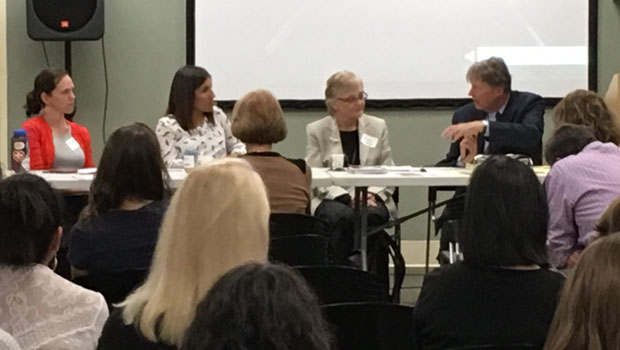HEAT panel explores social determinants of health

Ian Maki reflects on well-attended event sponsored by Group Health’s Health Equity and Access Team
by Ian Maki, MPH, a research associate/program manager at GHRI’s Center for Community Health and Evaluation
You may have heard that “all that is necessary for the triumph of evil is that good men [people!] do nothing.” And you probably already know that upstream factors—like income, race, housing, neighborhood, education, transportation, and trauma—influence population health outcomes more than do genetic inheritance, individual health/risk behaviors, and health care combined. But what are you doing about these social determinants of health?
Health care providers, staff, and systems have standing in the community to advocate on these issues. We treat and study the consequences of poor access to these determinants of health in our clinics and at Group Health Research Institute (GHRI). That’s what attendees heard on September 12 as Group Health’s Health Equity and Access Team (HEAT) hosted our best-attended event to date. More than 100 people—from all across Group Health and well beyond—participated in “Better Care Isn’t Our Biggest Health Challenge,” a panel discussion of the social determinants of health.
GHRI does a lot of research related to these social determinants, so it’s not surprising that many active HEAT members work at GHRI. The Group Health Physicians board of directors sponsors HEAT, which focuses on issues of the medically underserved. With Group Health colleagues, many faculty and staff within GHRI helped to plan and facilitate the event’s small-group discussions of the role health care providers and systems should play in addressing the social determinants of health.
Group Health Physician Charles Mayer, MD, who leads HEAT, introduced the moderator Stephen Tarnoff, MD, Group Health Physicians’ president and chief medical executive, and the panelists.
Local, county, and state leaders
- Marcy Bowers talked about, among other things, the importance of listening: “People know what they need, and if we listen to them, they become part of the solution.” Ms. Bowers is the executive director of the Statewide Poverty Action Network. The Network, the advocacy arm of Solid Ground, builds grassroots power to end causes of poverty and create opportunities for everyone in Washington to prosper. Reflecting a “community-centeredness” that parallels Group Health’s focus on patient-centeredness, Ms. Bowers and her staff listen through focus groups, listening sessions, and meetings with patients and clients.
- Teresa Mosqueda, MPA, outlined links between income gaps and public health. For instance, without sick leave, one in five service workers report going to work while sick with the flu. Ms. Mosqueda is the political and strategic campaign director of the Washington State Labor Council, AFL-CIO. She cited an article in the current American Journal of Public Health, “The Effect of an Increased Minimum Wage on Infant Mortality and Birth Weight,” linking state minimum wage laws to fewer cases of low birth weight and infant mortality. The authors estimated that if all states in 2014 had increased their minimum wages by $1, there would likely have been 2,790 fewer low birthweight babies born and 518 fewer child deaths for the year.
- Patty Hayes, RN, MN, who directs Public Health—Seattle & King County, stressed the importance of addressing the socio-ecological determinants of health equity—as well as the social determinants of health. She presented the California Endowment’s Framework for Health Equity, which guides the County’s ongoing focus on health equity through policy, environmental, and social change. She also described Best Starts for Kids, an initiative investing in prevention and early intervention for children, youth, families, and communities; and Communities of Opportunity, founded by King County and the Seattle Foundation to improve health and well-being in ethnically and geographically diverse communities throughout King County.
After the panelists’ presentations, the audience broke into facilitated small groups, each of which conducted lively discussions to address the question, “What role do health care systems and providers play in addressing the social determinants of health?” The groups surfaced many additional questions, to which the panelists provided some answers at the conclusion of the meeting.
Next steps
On September 29 at noon, Leana S. Wen, MD, MSc, will speak by video to Group Health Physicians’ Continuing Medical Education Medical Staff Videoconference Series—following up on her 2016 Group Health Birnbaum Lecture. You can watch video excerpts of that lecture here. Dr. Mayer and HEAT were key in connecting with Dr. Wen, who is the Baltimore City Health Commissioner.
On November 7 at 6 p.m., HEAT’s next meeting will explore more of the new questions raised at the September 12 event. This meeting will also include discussions of the answers to the original question from the various small groups. Please join us.
And please let your voice be heard.




